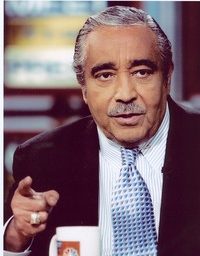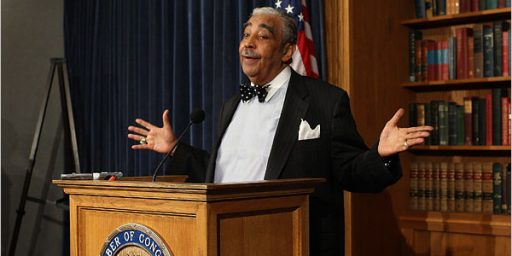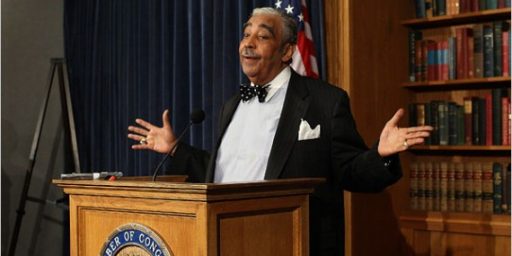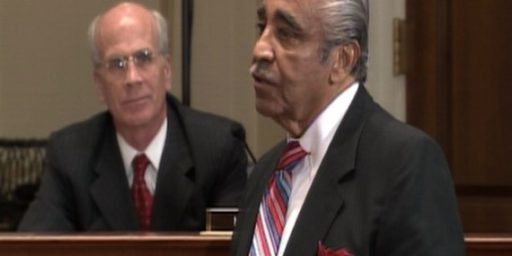Supporting the Troops
James Taranto issues a correction:
So it turns out we erred in an item yesterday on a House resolution honoring the troops who liberated Iraq. The 228-195 near-party-line vote to which we referred was on a procedural matter, not the resolution itself. We’re told that such procedural votes almost always come down along party lines. The House voted on the actual resolution yesterday evening, and it passed by a much bigger margin, 327-93.
Voting “no” were 90 Democrats, two Republicans (Jim Leach of Iowa and Ron Paul of Texas) and independent self-styled socialist Bernie Sanders of Vermont. One of the “no” votes came from Rep. Charles Rangel of New York, who in December 2002 urged the reinstatement of the military draft on the grounds that “a disproportionate number of the poor and members of minority groups make up the enlisted ranks of the military.”
Rangel seems to think the poor and members of minority groups who choose to serve their country–along with the better-off and members of majority groups who do–are unworthy of his respect. This isn’t the first time he has voted against a resolution honoring the troops in Iraq; he did so also just under a year ago. And as with the 2003 resolution, the vast majority of members of the Congressional Black Caucus voted “no”–23, against only 6 voting “yes” (and 3 “present”). Especially disappointing are the “no” vote from Georgia’s Denise Majette and the “present” vote of Alabama’s Artur Davis. Both are freshman representatives who ousted far-left Black Caucus members with histories of anti-Semitism. Also voting not to honor the troops was Rep. Nancy Pelosi, the Democratic leader.
The crux of the Resolution:
Resolved, That the House of Representatives–
(1) affirms that the United States and the world have been made safer with the removal of Saddam Hussein and his regime from power in Iraq;
(2) commends the Iraqi people for their courage in the face of unspeakable oppression and brutality inflicted on them by Saddam Hussein’s regime;
(3) commends the Iraqi people on the adoption of Iraq’s interim constitution; and
(4) commends the members of the United States Armed Forces and Coalition forces for liberating Iraq and expresses its gratitude for their valiant service.
Now, clearly, this Resolution–especially section (1)–is an attempt to embarrass those who opposed the war and to make political hay in an election year. Indeed, I think passing proclamations that have no public policy impact are almost always a pointless exercise. Still, I’m amazed that 93 Members voted against a Resolution that is going to paint them as “not supporting the troops” when surely everyone agrees with the statements above.
Even if one opposed the war, surely one must concede that the world is a safer place without Saddam’s regime in power. One can believe that and simultaneously believe that the way he was removed was a violation of international law, it wasn’t worth 500+ American lives to achieve, the resources could have been put to better use, or even that the war had wider repercussions that made us, on balance, less safe. So why vote against?
(Hat tip: Black Five, who has some additional thoughts on the matter.)





Obviously, Section 1 is the deal-breaker in this resolution. I’d be willing to bet…erm…James’s paycheck that 90% of the “No” votes were due to that section. They could never admit that the world has “been made safer with the removal of Saddam Hussein and his regime from power in Iraq.”
But no one has ever accused that crowd of intellectual honesty.
Agreed, Boyd. For all that it obvious to us, it is equally “obvious” to the anti-warBush crowd that the war in Iraq has made the world less safe. It is, in fact, an article of faith for them. Remove §1 and that Resolution would probably have passed with no more than 5 Nay votes and a handful of “Presents.”
Uh, safer according to what metric? If someone puts a bandaid on your cut finger while ignoring the massive hemmoraging coming out of your chest, then by your logic, the person has made you safer.
However, any sane person would see the obvious.
This mental model of yours is baffling.
i love the strawman hal. you may own your opinion.. but you don’t own the facts. there have been no terrorist attacks on US soil since 9-11. we have a newly democratic Iraq that is thankful to us and is helping us in the war on terror. democracy in the ME is helping destablize regimes that support terror.
now hal, go and see a doctor because you are suffering from cranial rectosis.
Ah, I love it when an intellectual joins the conversation. The imaginative insults. The compelling arguments. The clear and thoughtful exploration of the facts.
Brings a tear to my eye.
It’s almost a given that REMOVING SADDAM made the world safer and better. It’s debatable as to whether THE WAR made us safer. Maybe in the very short term it didn’t, as it probably accelerated a fight that might not have happened for a while. OTOH, the fight is taking place somewhere there’s a concentration of armed and ready American troops rather than the streets of the U.S.
So why vote against?
Simple. Gerrymandering.
The House is now to a point where every seat is safe. So when you have people that represent whack jobs like our pal Hal, they will vote like whack jobs.
If the republicans proposed a measure saying Iraq was better off without Saddam, a decent hunk of the whack jobs would vote against it because their constituent base is just that nuts.
Hooray for gerrymandering.
“Even if one opposed the war, surely one must concede that the world is a safer place without Saddam’s regime in power.”
Bless you, James: this innocent belief of yours in the ability of the hardcore antiwar movement to even briefly overcome their rectocranial inversion is a beacon of hope in these troubled (but getting better) times.
Maybe in the very short term it didn’t, as it probably accelerated a fight that might not have happened for a while. OTOH, the fight is taking place somewhere there’s a concentration of armed and ready American troops rather than the streets of the U.S.
Exactly. Elementary battle strategy: if you can, bring the enemy to battle on your terms, not his.
Yes, getting rid of Saddam was a good thing. But since he was in his cage and not a threat to anyone but his own people, how did this make us any safer?
Were we threatened by him? Were the sanctions not working? Was he trafficking in non-existent WMD?
Exactly what is the metric here, James?
You can’t simply say that we’re safer and it’s obvious to all. You have to provide some concrete measurements that show it.
If you make us 1″ safer on the “safe o’ scale” and by doing so you make us 1 mile unsafe on the “safe o’ scale”, then by simple addition you are now one mile – 1″ unsafe.
Focusing on the 1″ is terribly silly, although technically accurate.
What is it the bible says? “pity the man who gains the world, yet loses his soul”.
The concept is pretty universally understood. Well, except by the right wing of American politics.
Okay, let me just consult my “Scales & Measures” catalog and see who makes an instrument to measure safetitude…
—